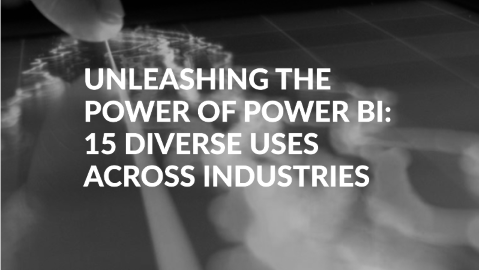
30 June 2023
If you've been wrestling with enormous datasets and struggling to extract meaningful insights, you might be missing a trick. The key to your conundrum is Microsoft's Power BI. But what is Power BI and how can it be used to make a profound impact across a myriad of industries? Remember, JBI offers a Power BI course taken by the top corporations in the UK including BBC, ITV, banking institutions and local government. Let's dive into the fascinating world of Power BI and reveal its multifaceted capabilities.
What do you get when you combine the adrenaline-filled world of sports with the analytical prowess of Power BI? The answer: unrivalled sports analytics.
How can Power BI transform sports? It's all about data. Performance metrics, player stats, and historical trends are just a tip of the iceberg. With Power BI, these data points are not only accessible but also analysable in real-time.
Let's take a real-world scenario. Imagine a football club struggling to identify patterns in their opponents' playstyles. With Power BI, they can analyse and visualise massive amounts of data, discovering unique insights and improving their game plans accordingly.
If you love football, be sure to take a look at JBI Training's exclusive interview with Ray Parlour, where he talks all things football and some funny anecdotes from his playing days.
Where does Power BI fit into the bustling, fast-paced world of retail? From inventory management to customer preferences, Power BI stands as a valuable tool in the retail industry.
For instance, a fashion retailer wants to understand buying patterns across seasons. Through Power BI's robust analytics, they can glean insights from years of sales data, predicting which items will be hot sellers in the upcoming season.
FinTech is not merely about moving money digitally. It's about harnessing the power of data to deliver personalised services. Here's where Power BI comes in, offering powerful analytical capabilities to transform raw financial data into actionable insights.
Take a FinTech startup developing a personal finance app. They can utilise Power BI to analyse user behaviour, identifying spending patterns and offering personalised financial advice, all driven by data.
Governments are not exempt from the data revolution. From public policy to city planning, data analysis plays a crucial role. Power BI, with its capacity to handle vast datasets, becomes a valuable asset in government decision-making.
Consider a local government needing to allocate resources for public services. Power BI can help analyse demographic data, helping officials make informed decisions based on citizens' needs.
Healthcare is a data-intensive field, with information ranging from patient records to treatment outcomes. Power BI can significantly simplify healthcare analytics, offering visual and interactive data insights to healthcare providers.
A hospital, for instance, can use Power BI to track patient recovery rates across different treatments. These insights can inform treatment plans and enhance patient care.
In manufacturing, efficiency is key. Power BI can provide an in-depth analysis of production processes, helping to pinpoint inefficiencies and devise solutions.
Imagine a car manufacturing plant using Power BI to analyse assembly line data. By identifying bottlenecks, they can make data-driven improvements, boosting production efficiency.
E-commerce is all about understanding the customer. From browsing behaviour to purchase patterns, Power BI can help e-commerce businesses optimise their strategies.
For example, an online retailer could use Power BI to analyse shopping cart abandonment data. This insight can lead to improved check-out processes, potentially boosting conversion rates.
HR is not just about hiring and firing. It's about understanding employee trends and optimising workplace practices. Power BI can revolutionise HR analytics, turning employee data into actionable insights.
An organisation could use Power BI to analyse employee satisfaction surveys, informing their
workplace policies to foster a happier, more productive workforce.
Let's now discuss the role of Power BI in sectors such as energy management and education insights. What impact can it make, and how can it redefine the way these industries operate?
In the energy sector, data is as crucial as the energy itself. From production to distribution, Power BI can streamline energy management, driving efficiency and cost-effectiveness.
Consider an energy company that needs to monitor power consumption across various regions. With Power BI, they can visualise this data in real-time, enabling swift decisions in case of power outages or overloads.
Education is increasingly data-driven. From student performance to administrative efficiency, Power BI can offer unparalleled education insights.
Imagine a university looking to improve student outcomes. By leveraging Power BI, they can analyse years of academic data, spotting trends, and using these insights to improve teaching methods or course designs.
In a complex supply chain, efficient data management is vital. Power BI can revolutionise supply chain operations, providing real-time insights that can boost efficiency and reduce costs.
A logistics company, for instance, could use Power BI to track shipment times, identify bottlenecks, and streamline their delivery process.
In marketing, data is the difference between a successful campaign and a failed one. Power BI can enhance marketing campaign analysis, helping businesses understand their audience better and tailor their strategies accordingly.
Consider an e-commerce business running multiple marketing campaigns. With Power BI, they can track campaign performance in real-time, adjusting strategies based on immediate feedback.
In the travel and hospitality industry, understanding customer preferences is key. From booking trends to guest feedback, Power BI can provide deep analytics that drive better service and greater customer satisfaction.
A hotel chain, for example, could use Power BI to analyse customer reviews across different locations. These insights can lead to service improvements, enhancing customer satisfaction and loyalty.
Telecommunications is a data-rich industry. From network performance to customer behaviour, Power BI can offer invaluable data insights, driving service improvements and competitive advantage.
Imagine a telecom company looking to improve network coverage. By using Power BI, they can analyse coverage data, identify gaps, and make data-driven decisions on where to set up new towers.
Non-profit organisations can also benefit from Power BI. From donor trends to project outcomes, Power BI can offer powerful insights that help these organisations measure their impact and optimise their efforts.
Consider a non-profit working on clean water projects. They could use Power BI to track project outcomes, demonstrating their impact to donors and identifying areas for improvement.
In the table below, let's summarise these 15 diverse uses of Power BI across industries:
| Industry | Use Case |
|---|---|
| Sports | Analysing player stats and performance metrics |
| Retail | Understanding buying patterns across seasons |
| FinTech | Analysing user behaviour and identifying spending patterns |
| Government | Allocating resources for public services based on demographic data |
| Healthcare | Tracking patient recovery rates across different treatments |
| Manufacturing | Identifying bottlenecks in production processes |
| E-commerce | Analysing shopping cart abandonment data |
| HR | Analysing employee satisfaction surveys |
| Energy Management | Monitoring power consumption across regions |
| Education | Analysing years of academic data for improved student outcomes |
| Supply Chain | Tracking shipment times to streamline delivery process |
| Marketing | Tracking marketing campaign performance in real-time |
| Travel and Hospitality | Analysing customer reviews for service improvements |
| Telecommunications | Analysing coverage data to improve network coverage |
1. How does Power BI improve decision-making in business?
Power BI improves decision-making by providing data-driven insights. With these insights, businesses can identify trends, understand customer behaviour, and make informed decisions.
2. Can Power BI be used across different industries?
Yes, Power BI is versatile and can be used across numerous industries, including sports, retail, FinTech, government, healthcare, manufacturing, and more.
3. What is the advantage of Power BI over other data analytics tools?
Power BI is user-friendly, offering advanced visualisations and easy-to-use dashboards. It's also highly integrative, compatible with various data sources.
4. How does Power BI contribute to marketing campaign analysis?
Power BI enables real-time tracking of marketing campaign performance. This allows for immediate adjustments based on feedback, increasing the chances of campaign success.
5. Can Power BI be used in the non-profit sector?
Absolutely. Non-profit organisations can use Power BI to track project outcomes, demonstrate their impact to donors, and identify areas for improvement.
In conclusion, Power BI is a versatile tool that can revolutionise data analysis across various industries. Power BI is updated regularly, and its ability to provide insightful visualisations and real-time feedback makes it an invaluable asset for any organisation looking to leverage data for better decision-making.

CONTACT
+44 (0)20 8446 7555
Copyright © 2025 JBI Training. All Rights Reserved.
JB International Training Ltd - Company Registration Number: 08458005
Registered Address: Wohl Enterprise Hub, 2B Redbourne Avenue, London, N3 2BS
Modern Slavery Statement & Corporate Policies | Terms & Conditions | Contact Us
POPULAR
AI training courses CoPilot training course
Threat modelling training course Python for data analysts training course
Power BI training course Machine Learning training course
Spring Boot Microservices training course Terraform training course